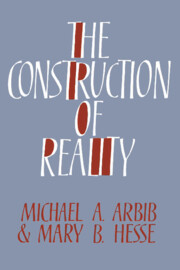Book contents
- Frontmatter
- Contents
- Preface
- Chapter 1 Posing the problem
- Chapter 2 The intelligence of the artificial
- Chapter 3 Schema theory
- Chapter 4 Relating mind and brain
- Chapter 5 Freedom
- Chapter 6 Freud on psychology and religion
- Chapter 7 Schemas: from the individual to the social
- Chapter 8 Language, metaphor, and a new epistemology
- Chapter 9 Interpretation and reality
- Chapter 10 Religions as social schemas
- Chapter 11 The Great Schema
- Chapter 12 Secular schemas
- References
- Author index
- Subject index
Chapter 4 - Relating mind and brain
Published online by Cambridge University Press: 22 September 2009
- Frontmatter
- Contents
- Preface
- Chapter 1 Posing the problem
- Chapter 2 The intelligence of the artificial
- Chapter 3 Schema theory
- Chapter 4 Relating mind and brain
- Chapter 5 Freedom
- Chapter 6 Freud on psychology and religion
- Chapter 7 Schemas: from the individual to the social
- Chapter 8 Language, metaphor, and a new epistemology
- Chapter 9 Interpretation and reality
- Chapter 10 Religions as social schemas
- Chapter 11 The Great Schema
- Chapter 12 Secular schemas
- References
- Author index
- Subject index
Summary
From reductionism to schema theory
The language of mental phenomena often sets the stage for our study of the brain, and many neural phenomena can best be described in terms of their role within mental acts or the behaviors of organisms. Yet, we do not see neural levels of description as superseded by the mental. Rather, our aim is to develop a schema theory that makes contact with the phenomena of everyday experience but that can, where appropriate, be supplemented at the neural level of description.
All of the many kinds of mind/brain reductionism have in common a naturalistic basis: there are no mental events not explicable by brain science. It follows from this statement that the terms of mental language are all in principle describable in terms of brain language. As we shall see, however, it is possible that mind and brain science are not yet complete enough for the descriptions to be carried out in practice. Dualism, on the other hand (as exemplified by Eccles, Section 4.2), holds that mind involves some entity or substance not identifiable with anything in the material brain.
- Type
- Chapter
- Information
- The Construction of Reality , pp. 63 - 84Publisher: Cambridge University PressPrint publication year: 1986



